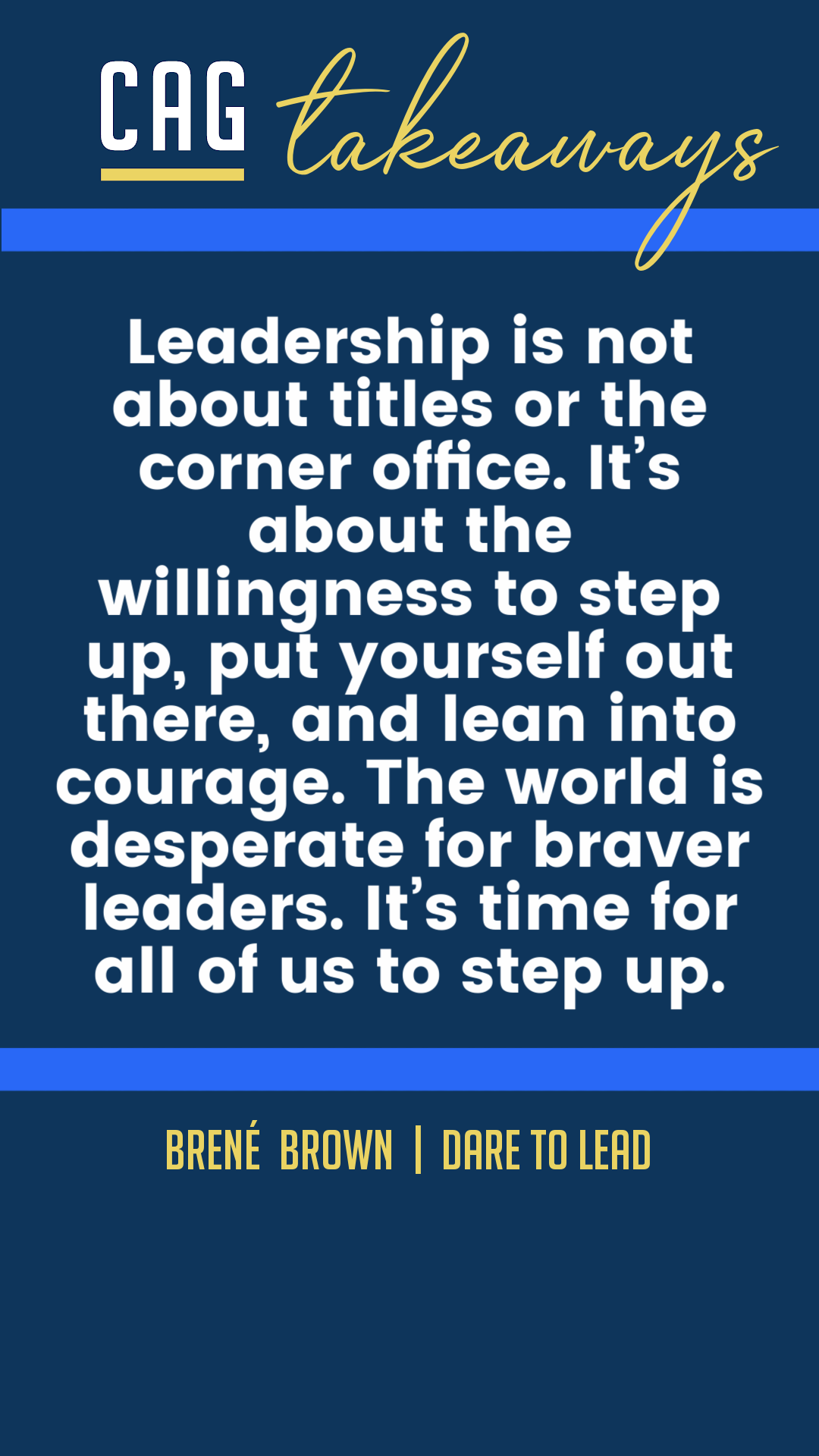
What kind of leader are you? Daring Leadership Series Part 1
 There have been times in my life where I’ve been really proud of my leadership, and there have been others where I have crumbled under pressure into a whole heap of suck. Every time those moments happen (good, bad or ugly) I try to make myself stop, reflect and consider the particular situation that led to the outcome. Was I my best self? Did I set myself up for success or failure before I even attempted to lead? Did I fix whatever went wrong? All these questions led me to a deep dive on Brené Brown’s Dare to Lead so I can really answer the questions: “What kind of leader are you?” and more importantly, “What kind of leader do you want to be moving forward?”
There have been times in my life where I’ve been really proud of my leadership, and there have been others where I have crumbled under pressure into a whole heap of suck. Every time those moments happen (good, bad or ugly) I try to make myself stop, reflect and consider the particular situation that led to the outcome. Was I my best self? Did I set myself up for success or failure before I even attempted to lead? Did I fix whatever went wrong? All these questions led me to a deep dive on Brené Brown’s Dare to Lead so I can really answer the questions: “What kind of leader are you?” and more importantly, “What kind of leader do you want to be moving forward?”
Maybe you’ve felt the same way, and have also wondered about how to be better next time. Here’s Part 1 in our Daring Leadership series where we’re going to talk about what your leadership might look like now, and the type of leader you might want to be in the future. (Stay tuned for future parts in the series!)
TIME: FRIEND OR FOE?
“Time is, hands down, our most coveted, most unrenewable resource.”
I love this Brené quote because I couldn’t agree more. And most often, when I’ve found myself up against a wall and at risk of poor leadership, it’s because I’ve neglected myself and accounting for the time better leadership takes. When we’re rushed, overworked and undervalued, we are most likely to make mistakes, respond from a place of exhaustion, and be frazzled with our teams.
Ask yourself, what kind of leader are you under a time crunch? As you’re considering your own leadership scenarios, are you budgeting for enough time to invest in the people who matter most to you, and their work as well as your own? This is probably one of the easiest places to start to build and maintain a healthy leadership style.
WHAT WE HAVE vs. WHAT WE NEED
It’s all well and good to talk about perfectly crafted teams, and projects in theory, but what happens when real life doesn’t even begin to hold up to that vision? When a lack of brave leadership and courage actually promotes and increases the likelihood of poor outcomes? Ugh. Been there. Done that. One star. Do not recommend.
“We need braver leaders and more courageous cultures.”
When we try to avoid the elephants in the room that are causing friction, what we end up doing is making our own leadership and teams suffer. And why? Because confronting things that aren’t working (versus pretending they’re not happening) takes a ten-ton amount of bravery and courage. And those traits are hard to come by, and hard to flex when we’re not operating from a place of vulnerability but rather a place of protection. (But more on that later.)
“If you choose courage, you will absolutely know failure, disappointment, setback, and even heartbreak. That’s why we call it courage. That’s why it’s so rare.”

10 BEHAVIORS THAT “GET IN THE WAY” OF EFFECTIVE LEADERSHIP
I’ll spend more time talking about each of these later in the series, but I wanted to quickly highlight the ten (10) behaviors that stifle effective leadership. I’m sure you’ll be able to work your way down the list and remember times when you’ve been subjected to these leadership styles, and, perhaps, exhibited them yourself.
What kind of leader are you when you’re involved with any of these behaviors? Are you who you want to be?
LET’S JUST AVOID THE SUCK
We avoid tough conversations, including giving honest, productive feedback because it’s hard and feels gross. We pretend being “nice and polite” is better, when really it’s just about avoiding what’s hard for us to do.
ASK YOURSELF…
? What kind of leader are you when you’re faced with tough conversations?
Do you immediately confront them, or do you put them off to try and avoid upsetting anyone…including yourself?
NO FEARS TO SEE HERE…JUST A FEW PROBLEMS
Rather than addressing the fears leaders and individual team members are facing about the group dynamics or tasks at hand, we spend time managing problematic behaviors instead. Rather than spending time really digging into what’s upsetting people (ourselves or others) we simply act as if it’s a matter of “personality” or “fussiness.” Hint: It is almost never these things. It is almost always fear.
ASK YOURSELF…
? What kind of leader are you when you’re confronting your biggest fears?
Do you try to hide those fears and point out other problems? Or do you look internally for how you might be contributing to the situation?
WE DON’T NEED NO STINKIN’ TRUST
Oh, how I’ve experienced this one…from both sides. When we don’t take the time to build up the humanity of the members of the team and establish some trust between those members, things fall apart. Maybe not immediately. But eventually. Trust is diminished because the group’s members lack connection and empathy for each other’s perspectives. And this only leads to other issues in group dynamics.
ASK YOURSELF…
? What kind of leader are you when someone brings a problem to you?
Do you take the time to really listen to them and dig deep to get to the emotional layer, or do you chalk it up to a “difficult” personality?
CHANGE IS SCARY—LET’S NOT
If things are feeling too comfortable, you can almost be certain not enough people are taking smart risks. Rather we’re keeping the status quo in place and groupthink has firmly set in. A lack of growth due to a lack of change isn’t actually effective leadership. It’s just not as scary. And we love comfortable leadership.
ASK YOURSELF…
? What kind of leader are you when someone challenges you to change?
Do you fight change? Or do you embrace trying new things and listening to new perspectives for potentially better outcomes?
CONSTANT UNHAPPINESS
If you’re leading or working on a team and one or multiple people are constantly unhappy, something is decidedly wrong. If this festers for too long, we get stuck in a sea of “unhappy.” Then we start spending too much time reassuring team members who question their individual contribution and value. And, in my experience, unhappiness spreads and turns into a much larger problem later if ignored today.
ASK YOURSELF…
? What kind of leader are you when you spot an unhappy team member?
Do you spend time trying to learn more about what’s really wrong, or addressing the problematic behaviors that likely accompany an unhappy individual contributor?
IT’S NOT MY FAULT—IT’S SOMETHING ELSE
When there’s too much shame and blame, there’s not room for enough accountability and learning. And, we are decidedly bad at accountability because it feels so gross. (That’s of course unless you flex that muscle over and over and get used to showing up and taking responsibility when things go awry on your teams.) It’s only when accountability is high that we can leave space for learning and growth. And that’s the space where the magic thrives.
ASK YOURSELF…
? What kind of leader are you when someone is forcing you to take accountability for the team and your role on that team?
Do you step up and honor your responsibility as a leader to hold yourself and others accountable to find a resolution? Or do you shun accountability and look for a place to set the blame down?
WHAT DIVERSITY PROBLEM?
You’d just have to be under a rock to not know about the importance of diversity and inclusion in the workplace today. When leaders (or team members) avoid diversity and inclusion conversations for fear of being “wrong,” they’re choosing their own comfort, norms and privilege over having hard conversations. And that will increasingly produce less effective results for smart leaders, businesses and organizations.
ASK YOURSELF…
? What kind of leader are you when someone brings a diversity or inclusion issue to your attention?
Do you listen carefully and evaluate the problem, or feel uncomfortable even broaching the subject?
WE’RE IN A RUSH TO FIX THINGS—NOT SOLVE PROBLEMS
After 20+ years of working on my own businesses and tons of other people’s projects too, I have learned one thing with certainty. When you rush, you work harder. (And often you get to repeat your work all over again.) When we rush to a solution when something goes wrong, we don’t leave enough time to really solve the problem. We simply throw something at it and hope it sticks. And then we do that again, and again.
ASK YOURSELF…
? What kind of leader are you when a problem arises?
Do you take the time to actually address how it happened, or do you just want to rush to produce more work to “solve” it and move on? An unexamined issue will present itself again in the future. Promise.
WE’RE TOO SQUISHY WITH OUR WORDS
When we talk about things in generalities, and not concrete, measurable language, we leave room for interpretation. (Or, in some cases, a complete lack of interpretation.) When our values are opaque and aspirational instead of behaviors that can be taught, measured, and evaluated we confuse our teammates and peers. Sometimes we confuse our customers too.
ASK YOURSELF…
? What kind of leader are you when you’re asked about your vision, goals, values, and strategy?
Can you answer these questions directly with clear language that others can follow and help implement in their roles? Do you inspire others?
I’M PERFECT—SO WHY CHANGE?
Oh boy does this one hit home. As a person who’s suffered from “pleasing by perfecting” a long time in life, I have been in a dozen situations where this has reared its ugly head. Sometimes I’m the pleasing perfectionist, and other times I’m signaling (usually non-verbally) that I’m expecting to be pleased by someone else’s perfection. Neither scenario works out great and often the signal isn’t really accurate either. Perfectionism and fear keep people from learning and growing—even leaders. (Even this leader.)
ASK YOURSELF…
? What kind of leader are you when you’re combating perfectionism?
Do you stop and consider what’s most important—perfect or done—or do you exhaust yourself trying to control too much of the load?
WHAT BETTER LEADERSHIP CAN LOOK LIKE
Almost all of these hallmark behaviors can be cured with a big dose of vulnerability. Brené loves vulnerability so we’ll get lots of opportunities to talk about it in future posts. One of my favorite Brené quotes is this one:
“The courage to be vulnerable is not about winning or losing, it’s about the courage to show up when you can’t predict or control the outcome.”
And, I’d have to agree with her here that “the only thing I know for sure is that if you’re going to dare greatly, you’re going to get your ass kicked at some point.”
So the big takeaway is this…what kind of leader are you when you’re getting your ass kicked? When you can’t control the outcome? Challenge yourself to think about this more as you formulate your own leadership strategy, and give us a buzz if you’d like help formulating your first leadership goals.
Further Reading
Strategic Planning

Who Should Be Involved in Strategic Planning?
After you’ve learned more about strategic planning and whether you need a strategic plan of your own, you might start...
Marketing Strategy

Creating Your First Marketing Strategy – Free Template
Creating your first marketing strategy involves documenting the steps and ideas necessary to achieve your marketing...
Leadership

Courage & The Heart of Daring Leadership: Daring Leadership Series Part 2
Courage is the heart of daring leadership. So why is it so difficult to lead in a courageous way? In a...
Business Tools

Writing Your First Business Plan – Free Template
Writing your first business plan is one part knowledge, and another perseverance. Modern sentiment suggests that as an...










